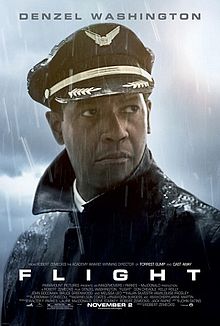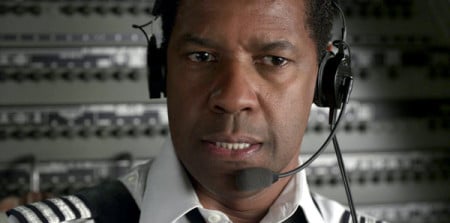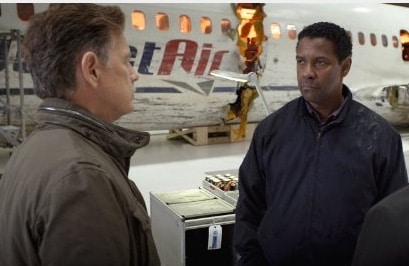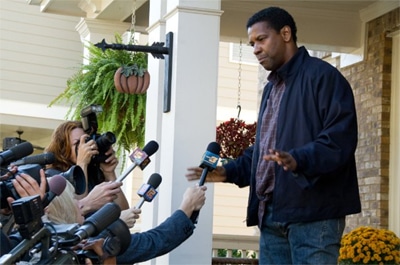
Thanks to Master Cat! Ben Frahm, who will be teaching at our one-day seminar on January 26, 2013, for this keen breakdown of the Denzel Washington starrer.
Writer: John Gatins
Director: Robert Zemeckis
Genre: RITES OF PASSAGE (ROP): “LIFE PROBLEM, WRONG WAY ACCEPTANCE” SUB-GENRE: ADDICTION PASSAGE
Opening Image:
— A plane takes off. It’s early morning. And the weather appears stormy. A glowing neon sign atop a hotel reads, “American Value Suites.”
— WHIP WHITAKER (Denzel Washington) wakes up in bed. Hung-over. Drugs everywhere. And a mostly naked STEWARDESS (KATERINA) walking around.
Set-Up:
— Whip takes a phone call in bed. It’s his EX-WIFE. And she’s not happy. He’s not making his child-payments. And their son needs to go to a better school. Whip is good at dodging her remarks and quickly gets off the phone.
— Whip is hung-over still. So he does a line of cocaine in order to get ready for his flight that morning.
— Based on what we’ve seen so far, we can tell this is usual behavior.
— Whip’s ready to fly. But the weather’s still iffy. His CO-PILOT (A NERVOUS YOUNG GUY) shows concern.
— The flight takes off, headed towards Orlando. But not before Whip slams two mini-wine coolers, just to help nurse his hangover some more. Whip quickly hides the empty bottles in the trash.

Catalyst:
— The stormy weather persists. Whip has to accelerate the plane in order to punch through. And does so, successfully.
— However, one of the engines goes out. They start to lose control. And nose dive. A series of technical failures occur, and it appears they have absolutely no control over the trajectory of the plane.
— The Co-Pilot panics. But Whip knows what to do. It’s clear he’s an incredibly skilled and confident pilot.
— Whip inverts the plane. They are now upside-down, and this pulls them out of their downward spiral. And just in time, Whip regains upright movement, and glides to a somewhat safe landing in a field.
— Fire. Smoke. Rescue vehicles. And screaming missionaries from a nearby Pentecostal church, come running. And we slowly fade out.
Debate:
— Whip wakes up in the hospital. He’s pretty banged up. But will be okay.
— Footage on the TV lets us know there were six fatalities in the crash. One of them was Katerina, the stewardess that we met in the opening scene.
— The media has already started calling Whip a hero for his miraculous landing.
— The NTSB (investigation team) is there to help gather information and testimony as to what happened.
— A union rep, MR. ANDERSON (Bruce Greenwood), is there to represent Whip and discuss the nuances of the flight that day.
— Whip tells Anderson that he did everything right. It was the plane that failed. Technical problems were responsible for those deaths. Nothing he did.
— And so this starts our debate. What will happen to Whip? Will they find out he had drugs in his system? And had been drinking? Will his addiction be discovered through this catastrophe? Or will he continue to be called a hero?
Break into Two:
— Whip knows he has to get out of the hospital. And calls his drug-buddy, HARLING (the hilarious John Goodman), who brings some cash. They plan to leave the hospital the next day. Whip will go to his farmhouse instead of his main residence to avoid the media frenzy.
— That night in the hospital, Whip shares a cigarette with a fellow patient, NICOLE (Kelly Reilly). She’s in for overdosing on heroin. And we know she struggles with addiction just like Whip.
B Story:
— Whip and Nicole’s conflicted and tumultuous relationship will be our B Story. She will help teach Whip the theme and serve as a mentor as the story continues. “Devious minds think alike.”
Theme Stated:
— A CANCER PATIENT at the hospital tells Whip: “random act of God? You survived a crash. And now you meet a beautiful girl in the stair. Fuck you man. At least you’re alive.”
Fun and Games:
— The next day, Whip escapes the hospital and goes to his farmhouse. We see remnants of a previous life. Pictures of his wife. And kid. Who are no longer a part of his life.
— Whip has to get clean. He has to stop drinking and abusing drugs. He empties out his house. Flushes everything. He’s serious this time.
— Whip starts to fix up an old plane that he used to fly with his father.
— Whip goes to meet with Mr. Anderson, the union rep, and a lawyer, HUGH LANG (Don Cheadle), who will represent him throughout this investigatory process.
— Whip becomes defensive with the lawyer. Tells him he did nothing wrong. And the lawyer tells him that they found alcohol and drugs in his toxicology/blood report after the crash. The NTSB will continue their investigation. And the lawyer will need Whip’s complete cooperation as they move towards the final testimony in front of the NTSB board.
— Whip leaves lunch early. Offended. Scared. And filled with anxiety. And so where does he turn? He starts drinking again.
— And goes to see his friend from the hospital, Nicole. She is having landlord problems. And needs a place to stay.
— So Nicole moves into Whip’s farmhouse.
— Their romance begins. And Nicole, who has started AA classes, does her best to keep Whip clean.

— Whip and the lawyer go to the scene of the crash. Whip confesses to everything. Says he drank before the flight. He drank the night before. And he did drugs, too. However, that plane crashed because of technical failure. And if it weren’t for his heroic landing, there would be a hundred people dead, instead of six.
— The lawyer tells Whip that the owner of the airline wants to talk with him tomorrow. He’s concerned about the financial ramifications of the crash and six deaths. Someone has to pay.
— The OWNER OF THE AIRLINE knows of Whip’s reckless and rambunctious behavior. But the lawyer reassures him not to worry. The tests at the hospital were flawed. The machines were dated. And the airline is only responsible for four deaths, as two were airline employees. The lawyer tells everyone not to worry.
— But Whip worries. He returns to drinking that night. And this causes tension in his relationship with Nicole, who is still doing her best to stay sober.
— The next morning, Nicole and Whip talk. She wants him to come to AA classes with her.
— Whip attends the funeral of Katerina, the stewardess that he used to sleep with.
— At the funeral, he sees the other stewardess, Margaret: who is religious; a loving mother; and Whip asks her to basically lie if she has to testify in front of the NTSB. Whip says that he only had two glasses of wine the night before the flight. Margaret knows about his addiction. But Whip is her friend. And after a tearful exchange, she agrees to lie on his behalf.
— Whip goes to an AA meeting with Nicole. He is the only one there who refuses to call himself an alcoholic.
— That night, Whip returns to the hospital to see his CO-PILOT and his wife. The Pilot was severely injured in the crash and his wife is not happy with Whip. They know he was drinking. But to our surprise, they are willing to vouch for Whip because they are convinced it was “God’s will” that they survived. And it is now their duty to continue the “Lord’s message.” Whip is relieved. But we can tell his guilt is intensifying.
— Whip returns to the farmhouse and continues fixing up his small plane. Whip tells Nicole that he wants to get away. He wants to go to Jamaica to get away from all of this. And he wants her to go with him.
— Nicole pulls away. She’s not so sure this is a good idea. And this causes Whip to become angry. And start drinking again.
— Nicole realizes that she can’t stay healthy with this kind of behavior. And…
Midpoint:
— Nicole leaves Whip. This devastates him. And throws him into another drinking binge.

Bad Guys Close In:
— And to make matters worse, Whip visits the lawyer at the airport hanger. The plane that crashed is there. And workers continue their investigation of the contents inside.
— The lawyer tells Whip that they have a problem. One of the investigators found two mini-wine bottles in the garbage. No one had access to these. Except for the Stewardesses and Whip. And the Stewardesses didn’t show any traces of alcohol in their toxicology reports.
— This new information could send Whip to jail for the rest of his life.
— Whip starts drinking more and more. His addiction is getting out of control.
— He goes to visit his EX-WIFE and SON. Whip is drunk. And he starts yelling. His son throws him out of the house.
— And outside, newscasters have gathered to get footage of the heroic pilot. Whip pulls it together and makes sure he doesn’t come across drunk.
— But Anderson sees the news footage and tells Whip that he has to lay low. No more drinking. No more erratic behavior. The NTSB testimony is only a few days away.
— Whip knows he needs help. And asks to stay at Anderson’s house. Anderson instead secures a hotel room for Whip. And makes sure a GUARD is there to supervise him at all times.
All Is Lost:
— At the secure hotel room. It’s the night before the NTSB testimony. The guard watches Whip’s every move. And his refrigerator has been emptied of any and all liquor.
— That night, Whip can’t sleep. And he sneaks into the adjoining room via a side door. There, a FULL LIQUOR fridge is discovered. And Whip can’t resist.
Dark Night of the Soul:
— Whip drinks all of the liquor in the fridge.
— Whip gets extremely drunk.
— And the next morning, when the lawyer and Anderson come to get him for the testimony, they find a passed out Whip. Blood is on the floor. It appears that Whip got so drunk that he fell and hit his head (Blake used to call this, the WHIFF OF DEATH moment).
— Hours before the testimony, Whip is barely conscious. And he appears to still be drunk.
— So whom do they call to fix the problem? Enter, HARLING—Whip’s drug-buddy that we met earlier in the hospital. Harling knows just what to do…
— Harling brings cocaine to help sober Whip. And it actually works.
— So now, Whip will be testifying high on cocaine.
Break into Three:
— At the NTSB TESTIMONY. Whip appears to be okay. They don’t know what kind of state he’s in.
— And after all of the evidence is examined, it appears Whip is going to get off okay. And not go to jail.
— However, Whip must testify that Katerina was the one who drank the two wine bottles. Whip must lie. And not only that, but defame the reputation of a person he loved… in doing so.
— CLOSE ON WHIP. He’s faced with a tough decision: lie and get off free— and blame Katerina for the reckless drinking on the flight; or confess and go to jail.
— Whip makes the right decision. And this is our BREAK INTO THREE. Whip confesses. To everything. And for the first time he confesses to having a drinking problem. And being an alcoholic.
Finale:
— DISSOLVE TO: we’re in jail. And we’re listening to Whip talk with some fellow INMATES. He tells his story. And for the first time, Whip says he feels alive. He feels free from his addiction. He’s been sober for over a year now.
— Pictures in the jail cell tell us that Nicole is back in Whip’s life. And that he has made amends with his Ex-wife.
— Whip has finally started putting his life back together. And if his good behavior continues, Whip will be released in a few years.
Final Image:
— Whip has a visitor. He walks outside to find his once estranged SON.
— The son is writing an essay for college. It’s titled “THE MOST FASCINATING PERSON THAT I’VE NEVER MET.” The son needs his father’s help in writing it. And as they talk and catch up, we know that Whip has been given another chance. And this time he won’t mess it up.
FADE OUT.
THE END.
BJ Markel
14 Comments
Leave a Reply Cancel reply
You must be logged in to post a comment.









Very keen breakdown, indeed! Great movie – and I enjoyed reviewing Ben’s beat sheet.
Great analysis. Thanks. Is the thematic question: Do you believe in God? “God” can have many meanings. God is love, or God is a deity in a specific religious faith, or God represents an ethical life, or God is the mystery & unknowable in the world. The meaning of God in “Life of Pi” seems different than the meaning in “Flight”. So I wonder what “God” means in “Flight.” I think it has something to do with being honest with one’s self. God is truth. But I’d love to hear Ben and others’ thoughts.
FLIGHT proves a point and provides a lesson for us all; a beat sheet, no matter how brilliant, does not make a superior film. It’s only a template for organization and structure, not a substitute for story. FLIGHT is an homage to Denzel and has so many internal problems that it’s a shame it’s being covered up with accolades. The entire premise is unbelievable and, unfortunately, the film falls victim to the Leaving Las Vegas trap, hammering the audience. Whit guzzles alcohol in quantities that would put him in a coma, throughout the film, to “show us” what a hopeless alcoholic he is. Cue Nicholas Cage. That’s only the beginning. But, I must say, for a Save the Cat film, I seem to have missed the Save the Cat moment (unless we’re suggesting it’s the entire plane sequence – possible, but it doesn’t land that way – there’s no sympathy, empathy or anything of like ilk anywhere in the picture for this guy, until the final moment, when – lo and behold – he confesses in front of a board of inquiry – who didn’t see that coming). And then, of course, at the end, we get another Denzel actor moment – a monologue in prison, telling us rather than showing us, how “free” he is. At any rate, when the most interesting people in a Denzel blockbuster are Don Cheadle and Bruce Greenwood, something’s missing. No big thing, just saying, Save the Cat is great but it’s not a substitute for truth in the telling, within the beats.
I like the break down, but I have a question about the break into three and finale sections. If we go by what’s listed then the finale, which generally ecompasses the final third of the movie, lasts only about 10 minutes. If you apply the Five Point Finale to the film then the hearing is the finale. The troops have gathred in the form of John Goodman, drugs, Don Cheadle etc. They try to excute the plan of him getting through the trial. The High Tower Surprise comes when he has to either admit that he was drinking and go to jail or Katerina was drinking and destroy what good there may be in him. He Digs Down Deep and debates the question. He executes his new plan by admitting that he has a problem and that it was his fault. Thoughts?
I would say the break into three is Whit’s decision to go to Bruce Greenwood and ask for help.
(The current break into act three is the climax, and the prison scenes are all coda.)
Denzel in the hotel room is the first part of the Five Point Finale… The High Tower surprise is the banging of the unlocked door leading to the mini-bar and Denzel getting drunk. This is initially overcome with Goodman’s Dr Feelgood medicine, but like any true hero, Denzel must face his dragon alone… When he admits the truth publicly, this is not a High Tower surprise (which is usually an external revelation no?), but a climactic action in the battle scene – he finally takes the first fully honest step in defeating his addiction.
I’d say that him asking for help would be a Flase Victory moment because he admits it then he stays sober 9 days before the trial starts. Dark Night is when he drinks and loses everything. Him admitting the truth publically would be an external revelation because the world now knows it. Unless you meant it in a different way. I still stand by it because the court room is a “defending of the castle” in a sense because he’s defending the story and himself.
Matt, I don’t think there is a High Tower Surprise in FLIGHT, which in my understanding is a specific, tangible and unanticipated move by the antagonist against the protagonist during the climax. In FLIGHT, the climax is the NTSB hearing. Melissa Leo, the nominal antagonist (I say nominal because we see so little of her prior to the climax) merely asks questions. She has no plan, really, and no secret weapon. And she does nothing unanticipated. The way she applies pressure is to merely repeat a question. If this is the High Tower Surprise (and I suppose a case can be made that it is), then it’s extremely weak. As for Rob’s issues concerning the Theme Stated, I think Ben correctly identifies it coming from the Cancer Patient. He is the “Herald,” the truth-teller, the film’s conscience, albeit a fairly obvious and theatrical one. But naming explaining exactly what the Theme Stated is in this film is a little harder: by bringing God into it (something that’s reiterated by various other characters), are we to think there is an overtly Christian message here, or at least “spiritual” one, about believing in a higher power, and by surrendering to it (as required by Twelve-Step programs) and in so doing we keep our ego under control? This is certainly possible considering that Whip’s enormous ego is both his gift and his curse, and it’s at the root of his addiction. Or, is Theme Stated that we need to appreciate life on a day-to-day, moment-by-moment basis, a “Be Here Now” message to appreciate life as a gift, as the Cancer Patient intimates by saying, “At least you’re alive.” Or is it both? Or is it something else? The Theme Stated is always a challenge in any story because it can’t be too obvious, but it has to be obvious enough that the audience can connect the dots later. Billy Wilder famously said, “Make even your subtlties obvious.” I think this applies particularly to the Theme Stated. And the sooner it’s done in a story, the better. It’s not by accident that Blake makes Theme Stated as the second point in the BS2, and I think that’s because the sooner it happens in a story (without being the very first thing, which would probably make it too obvious), then the more obvious the storyteller can dare to be. The scene with the Cancer Patient in FLIGHT is about 30 minutes into the film, which is kind of late, and since that character is pretty flamboyant, the filmmakers might have felt they had to hide the Theme Stated, make it more oblique than usual. That’s giving them the benefit of the doubt. Personally, I think the Theme Stated is unclear and muddled, to the film’s detriment.
What’s the Break Into Three? Look at Blake’s definition: “Thanks to a fresh idea, new inspiration, or last-minute thematic advice from the B Story, the main character heroically chooses to try again.” The key here is the Hero’s choice to move forward. I think it’s the moment he snorts the lines of coke in the hotel room. Specifically, it’s the moment he says, “I’m back.” So begins Act III. However, there’s no doubt it’s a short Act, primarily due to the truncated nature of the confrontation in the Finale. The opposition has no tools to fight with, so the only fight that occurs is the that happens inside Whip. That’s good, but not enough.
This coming Friday’s blog, “Could FLIGHT have soared higher?”, may be of interest — written by Tom Reed.
Denzel had be smokin’ the drapes when he screwed around with the screenplay in order to over-dramatise his own ‘worthy’ actor ‘moments’. Tom Reed nails the issues in his blog piece – a must read. To almost any citizen of the world, other than America, the movie is self indulgent, overwrought, confused, langourous pap. It needed a genuine script editor to work on the original text – not the Oscarphile actor who starred in it. Why did they do that – a sad case of ready – fire – aim?
I think, the Binto3 occurs when Denzel is being brought into the hotel room. The high tower surprise occurs, when he finds the door to the next room open and takes the bottle. Once again: everything seems lost.
The dig deep down moment occurs, when he is confronted with the dilemma of either confessing his alcoholis or desacrating the memory of a dead colleague. Which I found a brilliant piece of storytelling.
I really like this film despite some pace and minor structure problems.
Still: you got the transformation machine par excellance here. So why complain. In my book: this film should take home the Oscars with Django Unchained and Silver Linings. —
We should also start here a discussion about “Lincoln”, one of the worst films Spielberg ever made. And he only made three really bad films.
I think, the Binto3 occurs when Denzel is being brought into the hotel room. The high tower surprise occurs, when he finds the door to the next room open and takes the bottle. Once again: everything seems lost.
The dig deep down moment occurs, when he is confronted with the dilemma of either confessing his alcoholis or desacrating the memory of a dead colleague. Which I found a brilliant piece of storytelling.
I really like this film despite some pace and minor structure problems.
Still: you got the transformation machine par excellance here. So why complain. In my book: this film should take home the Oscars with Django Unchained and Silver Linings. —
We should also start here a discussion about “Lincoln”, one of the worst films Spielberg ever made. And he only made three really bad films.
I think the theme is very keenly stated on pg.5, when Margaret tells Whip there is a place next to her’s that’s waiting for him in church. That’s when the entire motif of God, faith, church, twelve step program kicks in. To me it is the subtlety being very obvious.
In response to Doug Kooperman’s comment:
The Save the Cat moment is when Whip instructs Margaret to speak into the black box and tell her son she loves him.